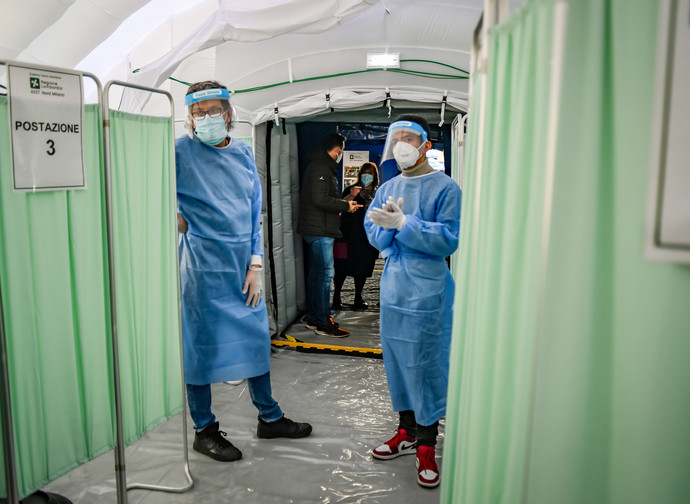Cells from aborted fetuses, does anyone still care?
The Holy See, Bishops and a number of Catholic intellectuals are the first to promote mass vaccination by ignoring Church documents on the requisites for the use of cells from aborted foetuses to be considered morally legitimate. This is an opportunity lost for the Church to evangelise.

Regarding the moral issue involving the use of vaccines, it is essential to take into consideration an aspect that is close to the heart of many Catholics. That is, the use of cell lines from aborted foetuses, "cell lines of illicit origin" defines the Instruction "Dignitas personae" (2008). It seems indispensable to us because the confusion its provoked recently, swings from the total trivialisation of the theme to the creation of urban legends.
The best place to start is from the real data: the vaccines currently in circulation in Europe all have to do in some way - for production, development or testing - with two cell lines from foetuses aborted 40 or 50 years ago. They are therefore cells developed in successive cycles starting from the original ones. There are no abortions being carried out now to produce these vaccines, nor are these cells present in the vaccine.
But does this mean that there is no-longer a problem? Not at all, the moral problem exists and to the point that the Church sets very specific conditions for the use of such vaccines to be considered morally lawful.
The first condition required is a state of necessity, that is "a serious danger, such as the otherwise irrepressible spread of a serious pathogen", as the recent Note of the Congregation for the Doctrine of the Faith (CDF) on the morality of use of some anti-Covid-19 vaccines (December 2020). So does this state of necessity exist today? The CDF Note assumes it does, even though the question is still very much open to debate. Let's examine the numbers in Italy for example, home to the Vatican, provided by the Italian government: since the beginning of the pandemic, the ascertained cases of Covid -19 (cases, not sick) are just over 3 million and 700 thousand, or 6% of the entire Italian population. Currently, however, the number of people positive in Italy is 536,361, or 0.9% of the population. Of these, 31,749 patients are hospitalised, 3,603 of whom are in intensive care. But in addition to the general data, it is particularly interesting that the average age of those deceased is 81 years (Istituto Superiore di Sanità, updated 31 March 2021), and that according to the records the deceased, on average, were already suffering from 3.6 pathologies. Whilst taking into account that timely medical treatment is being successfully tested, it can be safely said, if there is a need, that it concerns a specific segment of the population, namely the elderly and those suffering from specific pathologies.
The second condition required in order to speak of the morally licit use of these vaccines is that there are no ethically unexceptionable alternatives. Yet, this point too is open to debate. It is not that such alternatives do not exist at all, it is that neither the Italian government nor by any other European government makes them available. This might amount to an insurmountable problem for the individual citizen, but the discourse is different if associations, Catholic groups, the Church press for ethically flawless vaccines.
Even if we were to admit to the state of necessity and the absence of alternatives, it must be clear that the use of these vaccines "cannot in itself constitute legitimation, even indirectly, of the practice of abortion, and presupposes the opposition to this practice by those who use it" (Note of the CDF). But for this opposition to make sense it must be explicit, public. And it must turn into a form of pressure on pharmaceutical companies and government health agencies to "produce, approve, distribute and offer ethically acceptable vaccines that do not create problems of conscience either for health professionals or for the vaccinators themselves". Moreover, the Note of the CDF explains that "vaccination is not, as a rule, a moral obligation and that, therefore, it must be voluntary". It also foresees that conscientious objection is legitimate, that is, that individuals can refuse these vaccines.
Have you seen or heard our pastors say anything similar to this? Have you witnessed the Holy See take a stand on this, perhaps even - being the Vatican City a sovereign state - ensuring it is supplied with ethically guaranteed vaccines? Did at least one of the many Catholic intellectuals who preach on pro-life themes raise the problem? Certainly not, on the contrary: we have witnessed the Pope define vaccination as a moral duty, the Vatican State oblige its residents and employees to be vaccinated, the Italian Church allow parish premises to be used as vaccination centres and various pro-life intellectuals make a mockery of those who pose an ethical problem to the use of these vaccines.
While the Magisterium of the Church on these vaccines says "yes, but ...", thus placing stringent conditions, in practice the main representatives of the Church have passed directly to "yes without ifs and buts.” They have become champions of mass vaccination neglecting any ethical consideration and have put themselves at the service of the power of this world. An objectively scandalous attitude, meaning the Church is missing a great opportunity to "promote a new culture of life" (cf. Dignitas personae, no. 37).
What’s more, it should also be noted that certain indications must be placed in a broader context. The current context informs us that there is a growing use of foetal cells for pharmaceutical and cosmetic products, so keeping quiet about the ethics of anti-Covid vaccines and saying an unconditional yes to this kind of vaccination, is like a green light to this type of research and production.
